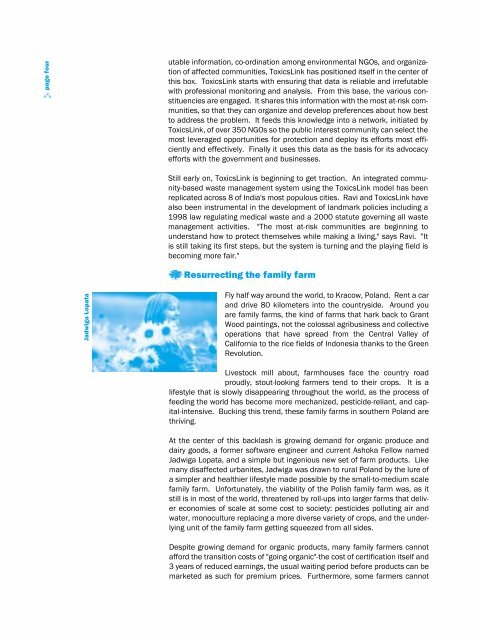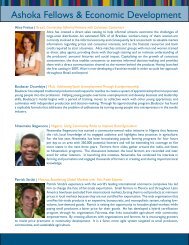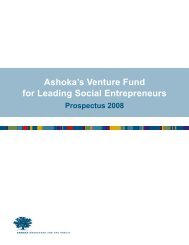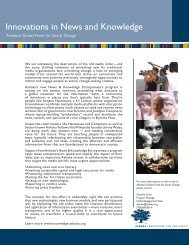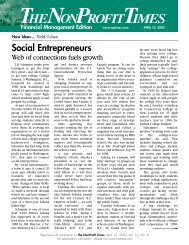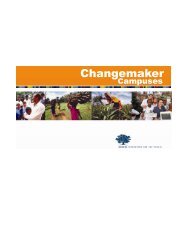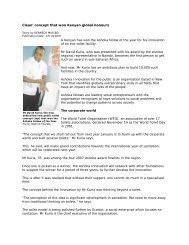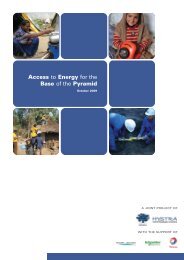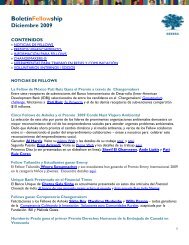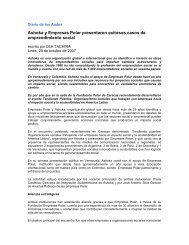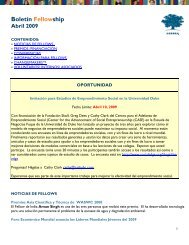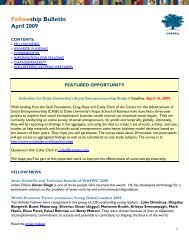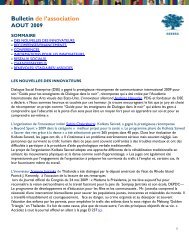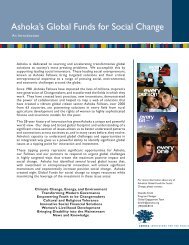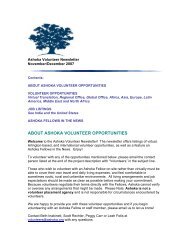Social Entrepreneurs: Doing Sustainable Development - Ashoka
Social Entrepreneurs: Doing Sustainable Development - Ashoka
Social Entrepreneurs: Doing Sustainable Development - Ashoka
Create successful ePaper yourself
Turn your PDF publications into a flip-book with our unique Google optimized e-Paper software.
page four<br />
Jadwiga Lopata<br />
utable information, co-ordination among environmental NGOs, and organization<br />
of affected communities, ToxicsLink has positioned itself in the center of<br />
this box. ToxicsLink starts with ensuring that data is reliable and irrefutable<br />
with professional monitoring and analysis. From this base, the various constituencies<br />
are engaged. It shares this information with the most at-risk communities,<br />
so that they can organize and develop preferences about how best<br />
to address the problem. It feeds this knowledge into a network, initiated by<br />
ToxicsLink, of over 350 NGOs so the public interest community can select the<br />
most leveraged opportunities for protection and deploy its efforts most efficiently<br />
and effectively. Finally it uses this data as the basis for its advocacy<br />
efforts with the government and businesses.<br />
Still early on, ToxicsLink is beginning to get traction. An integrated community-based<br />
waste management system using the ToxicsLink model has been<br />
replicated across 8 of India's most populous cities. Ravi and ToxicsLink have<br />
also been instrumental in the development of landmark policies including a<br />
1998 law regulating medical waste and a 2000 statute governing all waste<br />
management activities. "The most at-risk communities are beginning to<br />
understand how to protect themselves while making a living," says Ravi. "It<br />
is still taking its first steps, but the system is turning and the playing field is<br />
becoming more fair."<br />
Resurrecting the family farm<br />
Fly half way around the world, to Kracow, Poland. Rent a car<br />
and drive 80 kilometers into the countryside. Around you<br />
are family farms, the kind of farms that hark back to Grant<br />
Wood paintings, not the colossal agribusiness and collective<br />
operations that have spread from the Central Valley of<br />
California to the rice fields of Indonesia thanks to the Green<br />
Revolution.<br />
Livestock mill about, farmhouses face the country road<br />
proudly, stout-looking farmers tend to their crops. It is a<br />
lifestyle that is slowly disappearing throughout the world, as the process of<br />
feeding the world has become more mechanized, pesticide-reliant, and capital-intensive.<br />
Bucking this trend, these family farms in southern Poland are<br />
thriving.<br />
At the center of this backlash is growing demand for organic produce and<br />
dairy goods, a former software engineer and current <strong>Ashoka</strong> Fellow named<br />
Jadwiga Lopata, and a simple but ingenious new set of farm products. Like<br />
many disaffected urbanites, Jadwiga was drawn to rural Poland by the lure of<br />
a simpler and healthier lifestyle made possible by the small-to-medium scale<br />
family farm. Unfortunately, the viability of the Polish family farm was, as it<br />
still is in most of the world, threatened by roll-ups into larger farms that deliver<br />
economies of scale at some cost to society: pesticides polluting air and<br />
water, monoculture replacing a more diverse variety of crops, and the underlying<br />
unit of the family farm getting squeezed from all sides.<br />
Despite growing demand for organic products, many family farmers cannot<br />
afford the transition costs of "going organic"-the cost of certification itself and<br />
3 years of reduced earnings, the usual waiting period before products can be<br />
marketed as such for premium prices. Furthermore, some farmers cannot


